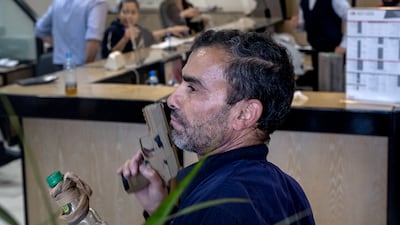Armed with bottles of petrol, two depositors held up a bank in Beirut on Thursday, attempting to forcibly recover about $30,000 of their own money.
In a rare failure, the two did not manage to recover their savings.
It was at least the fourth such bank raid this week as the nationwide phenomenon of angry depositors, desperate to access their own savings, continues.
The depositors are often aided and abetted by a network calling themselves the Depositors’ Outcry and a legal coalition called Moutahidoun that in most cases act as the legal council of the depositors.
“Depositors should not have to go to the banks and demand their own money,” Alaa Khourchid, president and founder of the Depositors' Outcry Association that helps people reclaim their savings – often by force – told The National. “But every action has a reaction.”
For two decades, Mr Khourchid lived in the West African country of Guinea, working and placing his savings in a Lebanese bank account.
But his money became trapped, along with hundreds of thousands of other people’s, in 2019 at the onset of Lebanon’s prolonged and severe financial crisis.
With the nation’s foreign reserves severely depleted and dollars scarce, its banks swiftly imposed illegal capital controls to avoid folding – preventing the outflow of money from the country and severely restricting the public’s access to their savings.
Mr Khourchid formed the Depositors’ Cry Association when it became apparent the majority of people’s savings may be gone forever.
“I refuse to believe my savings are lost or they won’t be recovered. Our money didn’t evaporate,” he told The National indignantly.
“Why should we suffer when there has been no accountability for the people who caused the economic crisis? Ordinary depositors have nothing to do with the financial problems facing the country. We didn’t cause them.”
The association has since vociferously encouraged citizens to demand their savings by storming banks, helping them to plan and co-ordinate hold-ups.
They are sometimes joined by Moutahidoun, according to Rami Olleik, the founder of the coalition, which lent Depositor's Outcry the legal basis to begun conducting bank raids.
Together they took responsibility for starting a “depositors' revolution,” according Mr Olleik, who has gained prominence for sometimes accompanying bank customers during raids.
“Unfortunately today’s operation didn’t work,” he said of Thursday's failed attempt to recoup savings because bank employees managed to sneak the branch’s money out of a back entrance before escaping.
It’s not uncommon to find Mr Olleik at the scene of a hold-up, advising bank customers on the best strategy for recovering their money.
On one occasion he was even arrested – for advising three depositors who managed to recover about $55,000 – before being released without charge.
Drifting apart
While Depositors’ Outcry and Moutahidoun had formed an understanding at the inception of the association, they have since drifted apart, Samia Sibaii, the treasurer of the Depositor’s Outcry, told The National.
"We focus on the legal aspects of conducting hold-ups, in the background. And we fought hard to give their association legal status,” Mr Olleik said, referring to Depositors' Outcry.
Both organisations maintain their actions are completely legal, relying on Article 184 of Lebanon’s penal code, which permits the use of force in self-defence or to protect one’s own money.
The depositors who storm the banks are often armed with Molotov cocktails, grenades, guns or rifles – sometimes fake, sometimes real.
To date, none of those behind the hold-ups – whether they acted alone, with the help of Depositors’ Outcry, or other associations – have been convicted.
And none of the raids have resulted in violence.
Mr Khourchid of Depositors' Outcry insists customers arm themselves as a scare tactic to convince bank employees to release their savings.
He says the association takes painstaking care to ensure the hold-ups don’t become violent.
“We are not interested in violence or in people being harmed,” he asserted. “Only in protecting our rights. We are pressuring for a solution. The state must come to a solution. The judiciary needs to pressure the banks and the state.”
While the Depositors’ Outcry is not the only organised group involved in conducting bank raids, nor the first, it is arguably the most infamous for inciting others to take action.
Since last year, the country’s banks have gradually transformed into walled steel fortresses, a defence mechanism against raids that has, ultimately, proven futile.
In an attempt to deter the wave of hold-ups, banks have even gone on strike several times.
Defending branches
This week, the Association of Banks (ABL) threatened to take further measures to defend branches.
"The banks are warning that they will not be able to continue business as usual,” an ABL statement said on Tuesday.
"This is not the way to deal with crises caused primarily by the state, and this is not how depositors will be able to recover the money that harmful policies have squandered over the years.”
While Depositors' Outcry and Moutahidoun are merely the most visible groups assisting in heists, it is not only ordinary people conducting the hold-ups.
In October 2022, MP Cynthia Zarazir, unarmed, stormed a bank branch, recovering $8,500 of her own money to pay for a medical operation not fully covered by her insurance.
She did so with the aid of the Depositors' Union, an association which also seeks to defend bank customers' rights.
To illustrate the demand for services assisting people in reclaiming their money, Mr Olleik said his organisation had a waiting list of at least 20 people seeking to conduct operations to recover their savings.
"One thing we know is we’re definitely worn out. We’re tired," he said. "But if someone is determined to stage a hold up, it we will back them up."


